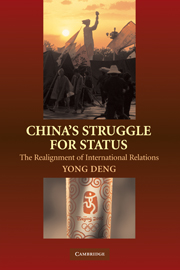Book contents
- Frontmatter
- Contents
- Figure and Tables
- Preface
- 1 Introduction
- 2 International Status and Chinese Foreign Policy
- 3 Negotiating the Human Rights Standard
- 4 Reacting to “China Threat Theories”
- 5 Strategic Partnerships with Russia, the European Union, and India
- 6 Independent Rivalry with Japan
- 7 Rediscovering Asia and Africa: The Multilateral Turn
- 8 Taiwan and China's Rise
- 9 China's Foreign Relations and the Emerging Great-Power Politics
- Index
2 - International Status and Chinese Foreign Policy
Published online by Cambridge University Press: 05 September 2012
- Frontmatter
- Contents
- Figure and Tables
- Preface
- 1 Introduction
- 2 International Status and Chinese Foreign Policy
- 3 Negotiating the Human Rights Standard
- 4 Reacting to “China Threat Theories”
- 5 Strategic Partnerships with Russia, the European Union, and India
- 6 Independent Rivalry with Japan
- 7 Rediscovering Asia and Africa: The Multilateral Turn
- 8 Taiwan and China's Rise
- 9 China's Foreign Relations and the Emerging Great-Power Politics
- Index
Summary
Influenced by Max Weber's classical definition of status as “effective claim to social esteem,” sociologists treat status as a separate analytic category from materialist bases of social stratification. In International Relations (IR), when the term is used in realist theory, status is no different from – and is, in fact, interchangeable with – power. For realists, status, like power, is zero-sum, and the means to advance it is through materialist means most prominently associated with war and war-fighting capacities. Our use of “status” here differs from both the standard use in sociology and mainstream IR theory. For our purposes, China's struggle for status is about creating an international environment that allows the Chinese Communist Party (CCP)-state to continue self-paced reforms at home; increase power and recognition abroad to secure China's core interests; reassure other states of China's nonthreatening intent; and projects its influence in Asia and beyond. Our definition conforms to the conviction of the Chinese political elites that the path for their nation's revival starts with the domestic front, but must join an international path to cultivate acceptance abroad on their own terms. It also reflects the reality in post–cold war world politics, where an amalgam of power, security, and social recognition drives great-power politics.
Without power, there is no recognition. Yet power without recognition fuels the fear of a China threat, obviating the international opportunities necessary for economic growth.
- Type
- Chapter
- Information
- China's Struggle for StatusThe Realignment of International Relations, pp. 21 - 68Publisher: Cambridge University PressPrint publication year: 2008



